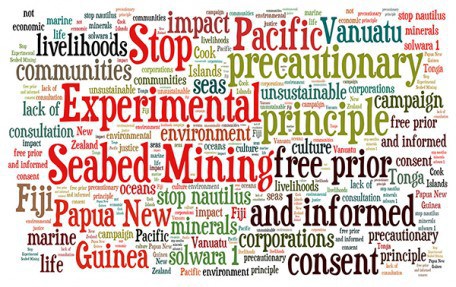
Source: EMTV
Following the denial of the second sea bed mining proposal in New Zealand by the Environmental Protection Agency (EPA) this month, the mining industry has called on the government to reconsider, rather ‘soften’ their new legislation on the matter.
EPA had appointed a Decision-Making Committee (DMC) which announced its decision earlier this month, rejecting Chatham Rock Phosphate’s application 'for a marine consent to mine phosphorate nodules on the Chatham Rise'.They were rejcted on the grounds of posing high risk to the natural ecosystems in the undersea world.
While the rejection was welcomed by environmentalists and many other local groups which are highly concerned about the vulnerable ‘undersea ecosystems’, Chatham Rock Phosphate was not as overjoyed considering the monetary losses they had made in the process.
Chatham Rock Phosphate’s managing director Chris Castle expressed his grave disappointment when the decision was announced.
“To say we are bitterly disappointed is an understatement. This will make it even harder, if not impossible for companies to attract capital for new projects in New Zealand,” a shocked Castle said in statement.
A Greenpeace report contributor, Richard Page via Financial Times, in the simplest way explained the dangers of seabed mining.
“It is difficult to contain mining waste on land. Imagine the problems of stopping the spread of pollution in an ocean environment. The local communities have every right to be, and indeed should be, concerned.”
Rejecting the second seabed mine application in less than one year is considered risky, as in a span of seven years there was about $100 million spent on both projects put together. Considering they had to reel in investors for this two failed projects is merely disappointing for the business world and their confidence in doing further businesses in New Zealand.
Phil McCabe, the chairman of Kiwi’s Against Seabed Mining, New Zealand Herald, proposes two reasons for the companies over-estimating their ability to obtain marine licenses for this untested industry, and losses occuring for investors.
“First, the companies could not prove their proposals were environmentally and economically acceptable," said McCabe.
"Second, the government underestimated the complexities involved in introducing into the marine environment what has been a wholly terrestrial commercial activity. It might be that large-scale mining in the marine environment is inappropriate for New Zealand altogether.”
Meanwhile the UN agency, International Seabed Authority, has so far issued about 26 exploration licenses to governments and companies enabling them to operate in international waters.
Whilst the seabed mining industry is still in its development stages, New Zealand, Namibia and Papua New Guinea have already awarded national licenses.
So far New Zealand has been successful in denying two applications for Sea Bed mining in their waters.
Canadian-based company Nautilus were, however, successful in getting a licence from the Papua New Guinea Government for their Solwara 1 project in the Bismarck Sea. Despite vocal protests from around the world, Nautilus is well underway to opening the first ever sea bed mine.
